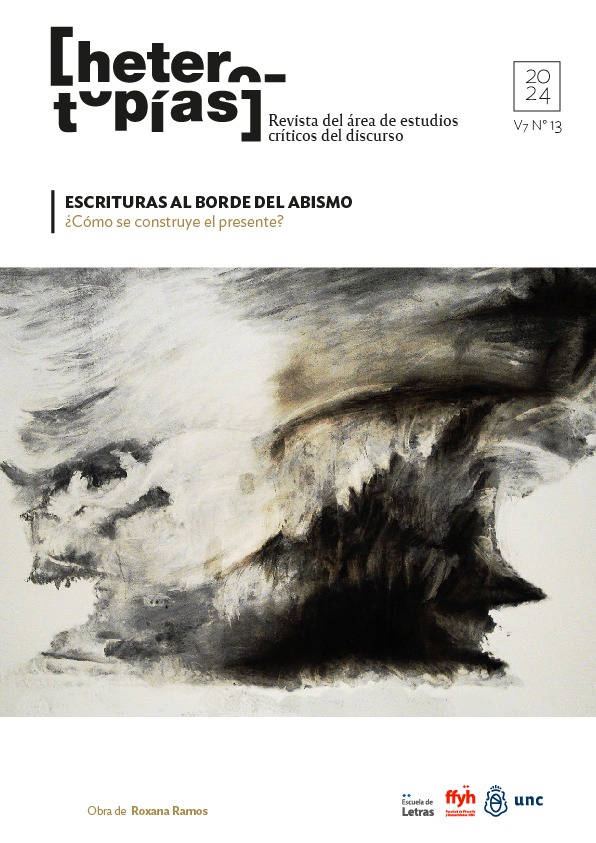Links with the past from the present in Desierto sonoro by Valeria Luiselli and Autobiografía del algodón by Cristina Rivera Garza
Main Article Content
Abstract
In this work I start from the concept "geological writings" (2022) proposed by the Mexican writer Cristina Rivera Garza (1964) to link it with the notions of the land, territoriality, displacements and rewritings of the past and its impact on the present in the Mexican novels Desierto sonoro (2019), by Valeria Luiselli (1983) and Autobiografía del algodón (2020), by Cristina Rivera Garza. The rewritings of official discourses and personal and collective histories, of other ways of living and letting oneself be inhabited by the landscapes embedded in the land and by the affections generated by belonging, the right to reside and to stay become fundamental in these geological writings. The borderland in relation to traces and residence as the right to belong is redefined with a record endowed with new meanings so as not to be erased from the map, nor to be from a place that does not appear on it. In these fictions there is a progressive impulse to fictionalize experiences that, based on the translation and rewriting of the official discourses of a revisited history, create creative fictions of the present that redefine the past with the right to stay.
Downloads
Article Details

This work is licensed under a Creative Commons Attribution-NonCommercial-ShareAlike 4.0 International License.
Those authors who have publications with this journal, accept the following terms: Those authors who have publications with this journal, accept the following terms:
a. The authors will keep their copyright and guarantee to the journal the right of first publication of their work, which will be simultaneously subject to the Creative Commons Attribution - Non-Commercial - Share Alike (by-nc-sa) Attribution License; no commercial use of the original work or any derivative works is allowed, the distribution of which must be done with a license equal to the one that regulates the original work.
b. Authors may adopt other non-exclusive license agreements for the distribution of the published version of the work (e.g., deposit it in an institutional telematic archive or publish it in a monographic volume) provided that the initial publication in this journal is indicated.
c. Authors are allowed and recommended to disseminate their work through the Internet (e.g. in institutional telematic archives or on their website) before and during the submission process, which may lead to interesting exchanges and increase the number of citations of the published work. (See The effect of open access).
How to Cite
References
Braidotti, R. (2000). Sujetos nómades. Buenos Aires: Paidós.
Butler, J. (2009). Dar cuenta de sí. Buenos Aires: Paidós.
Deleuze G. y F. Guattari (2006). Mil mesetas. Capitalismo y esquizofrenia. Valencia: Pretextos.
Derrida, J. (1997). Mal de archivo. Una impresión freudiana. Madrid: Trotta.
Foucault, M. (1989). La arquelogía del saber. Ciudad de México: Siglo XXI.
Haraway, D. (2020). Seguir con el problema. Generar parentesco en el Chthuluceno. Buenos Aires: Consonni.
Ferrer, R. ([1999]2019). Vagos sin tierra. Asunción: Servilibro.
Luiselli, V. (2016). Los niños perdidos. Ciudad de México: Sexto piso.
Luiselli, V. (2019). Desierto sonoro. Buenos Aires: editorial Sigilo.
Pratt, M. L. (2018). Imaginarios planetarios. Madrid: Aluvión editorial.
Revueltas, J. ([1949]2003). El luto humano. Ciudad de México: Era ediciones.
Rivera Cusicanqui, S. (2018). Un mundo Xí es posible. Buenos Aires: Tinta y limón.
Rivera Garza, C. (2015). Dolerse. Textos desde un país herido. Edición aumentada. Santiago de Chile: Ediciones del Cardo.
Rivera Garza, C. ([2013]2019). Los muertos indóciles. Necroescrituras y desapropiación. México: Tusquets.
Rivera Garza, C. (2020). Autobiografía del algodón. Buenos Aires: Random House.
Rivera Garza, C. (2020ª). Breve historia íntima de la escritura en migración, FILBA. https://filba.org.ar/filba-online-2020/filba-online-2020-filba-filbita_106/participantes/rivera-garza-cristina_719
Rivera Garza, C. (2022). Escrituras geológicas. Madrid: Iberoamericana.
Stengers, I. (2017). En tiempos de catástrofes. Cómo resistir a la barbarie que viene. Buenos Aires: Futuro anterior.
